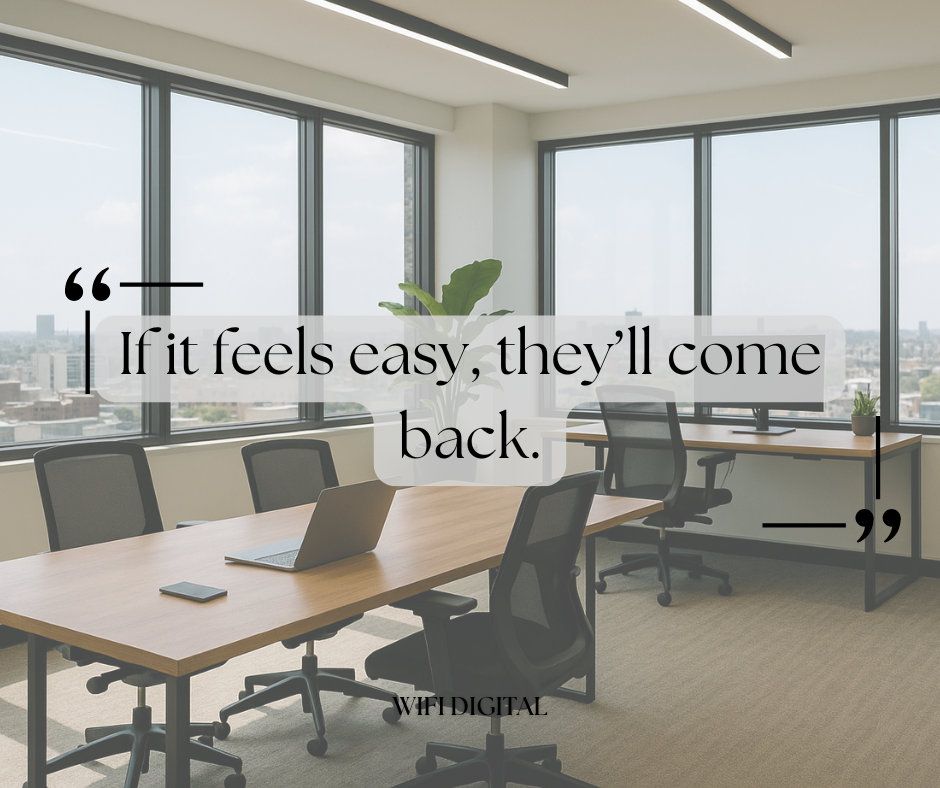In today’s digital landscape, a user-friendly web design is crucial for businesses to stand out and connect with their audience. At WiFi Digital, we understand the importance of creating a seamless online presence that fosters meaningful interactions.
By focusing on intuitive website layout, we help entrepreneurs, creators, and conscious businesses establish a genuine connection with their customers. Our approach to website design prioritizes clarity, authenticity, and real presence online.
Through our expertise in crafting user-centric websites, we empower businesses to step out of the digital noise and into a communication style that resonates with their audience. At WiFi Digital, we are committed to delivering website design with user experience at the forefront, ensuring that our clients thrive in the online world.
The Foundations of Website Design with User Experience
In the realm of website design, user experience stands as a pivotal element that dictates the success of a digital presence. At its core, user experience is about creating a connection between the user and the website, fostering an environment where users can navigate effortlessly and achieve their goals.
Balancing Aesthetics with Functionality
A user-centric web design approach emphasizes the importance of balancing aesthetics with functionality. A website that is visually stunning but difficult to navigate can deter users, while a site that is functional but lacks visual appeal can fail to engage. Responsive website development ensures that the website adapts to various devices and screen sizes, providing a consistent user experience across different platforms.
To achieve this balance, designers must consider the layout, color scheme, typography, and imagery, alongside the site’s navigation and information architecture. By doing so, they can create a website that is both beautiful and functional, enhancing the overall user experience.
Designing for User Intent and Journey
Optimized site navigation is crucial for guiding users through their journey on the website. Understanding user intent and designing the site to meet these needs is fundamental. This involves creating clear pathways for users to follow, ensuring that they can easily find the information or complete the actions they are seeking.
By focusing on the user’s journey, designers can identify potential pain points and areas for improvement, allowing for a more streamlined and intuitive experience. This not only enhances user satisfaction but also contributes to the site’s overall effectiveness in achieving its intended purpose.
In conclusion, the foundations of website design with user experience are built on a deep understanding of both the aesthetic and functional aspects of the site, as well as a keen insight into user intent and behavior. By balancing these elements, designers can create websites that are not only visually appealing but also provide a seamless and engaging user experience.
Creating Seamless Navigation Pathways
In today’s digital landscape, intuitive website navigation is key to capturing user engagement. A seamless user experience is crucial for retaining visitors and encouraging them to explore the website further.
Minimalist Menu Structures
Adopting a minimalist menu structure is essential for simplifying the navigation process. By limiting the number of menu options, users can easily find what they’re looking for, enhancing their overall experience. This approach also contributes to a mobile-friendly website design, as it simplifies the layout for smaller screens.
A clutter-free menu not only improves usability but also reflects positively on the brand, conveying a sense of professionalism and attention to detail.
Strategic Call-to-Action Placement
Strategic call-to-action (CTA) placement is vital for guiding users through the website and prompting them to take desired actions. CTAs should be prominently displayed and designed to stand out, making it clear what action the user is expected to take next.
By placing CTAs strategically, businesses can significantly improve the effectiveness of their website, driving conversions and ultimately enhancing their online presence. An intuitive website layout ensures that these CTAs are not only visible but also contextually relevant, further enhancing the user experience.
By focusing on creating seamless navigation pathways, businesses can significantly enhance the user experience on their website. This involves not just the implementation of minimalist menu structures and strategic CTA placement but also ensuring that the overall design is cohesive and user-centric.
Responsive Design: Adapting to Every User’s Needs
Responsive website development is at the forefront of creating user-friendly web design that caters to a diverse range of users. With the vast array of devices available, from smartphones to desktop computers, a website must be able to adapt seamlessly to different screen sizes and resolutions.
A responsive design ensures that the layout, content, and visual elements are optimized for various devices, providing an optimal viewing experience. This adaptability is crucial for engaging users and encouraging them to explore the website further.
Color Contrast and Readability Standards
One of the critical aspects of responsive design is ensuring that the website meets color contrast and readability standards. This involves selecting color schemes that provide sufficient contrast between the background and text, making it easier for users to read and navigate the site.
According to the Web Content Accessibility Guidelines (WCAG), a contrast ratio of at least 4.5:1 is recommended for normal text. By adhering to these standards, websites can ensure that their content is accessible to a wider audience, including users with visual impairments.
Navigation Options for Different Abilities
Another essential aspect of responsive design is providing navigation options that cater to different abilities. This includes incorporating features such as clear and consistent navigation menus, large clickable areas, and the ability to navigate using assistive technologies like screen readers.
By incorporating these features, websites can ensure that all users, regardless of their abilities, can navigate and access the content easily. This not only enhances the user experience but also reflects WiFi Digital’s commitment to creating inclusive and accessible websites.
Visual Elements That Foster Authentic Connection
As users navigate through a website, the visual cues and design elements should work in harmony to create an intuitive and engaging experience. A well-crafted visual identity helps to establish trust and fosters a sense of connection between the user and the brand.
Humanizing Digital Spaces Through Thoughtful Design
Incorporating user-centric web design principles is essential for creating a digital environment that feels welcoming and inclusive. By using imagery, typography, and color schemes that resonate with the target audience, designers can craft a seamless user experience that promotes engagement and understanding.
The strategic use of visual elements can also help to humanize digital spaces, making them feel more approachable and relatable. By incorporating personal touches and emotional connections, brands can create a sense of authenticity that resonates with their audience.
Ultimately, a website that combines intuitive website layout with thoughtful visual design elements can establish a strong foundation for building trust and fostering meaningful connections with its users.
Beyond Aesthetics: Intentional Website Design with User Experience
A well-designed website goes beyond aesthetics, focusing on user experience and intentional design practices. At WiFi Digital, we understand that a website is more than just a visually appealing interface; it’s a gateway to meaningful connections with users.
Intentional website design is about creating a seamless and intuitive experience that guides users through the website, fostering engagement and trust.
Building Trust Through Transparent Design Practices
Transparent design practices are crucial in building trust with users. This involves being clear about the website’s purpose, ensuring that navigation is intuitive, and providing a mobile-friendly website design that adapts to every user’s needs.
By prioritizing optimized site navigation and transparent design practices, businesses can create a website that not only looks great but also provides a user-centric experience, driving meaningful connections and conversions.
At WiFi Digital, we believe that intentional website design is about creating a digital presence that resonates with users, aligning with our commitment to ethical and intentional digital strategy.
Transforming Digital Presence into Meaningful Connection
Creating a website that fosters authentic connections requires a deep understanding of user experience and intuitive navigation. By incorporating user-friendly web design, visually appealing website design, and seamless user experience, businesses can establish a strong online presence.
At WiFi Digital, the goal is to position itself as a leading partner for entrepreneurs, creators, and conscious businesses by delivering exceptional website design that drives meaningful connections. By doing so, WiFi Digital enables businesses to thrive in the digital landscape.
A well-designed website is more than just a digital footprint; it’s a gateway to building lasting relationships with customers. By prioritizing user-centric design, businesses can create a seamless user experience that resonates with their target audience.
WiFi Digital invites entrepreneurs and businesses to collaborate and achieve their online goals through expert website design and development. Together, they can create a digital presence that truly connects with users.
WiFi Digital: Connecting Businesses to the Digital Future
In today’s fast-paced world, where a strong digital presence is essential for business growth, WiFi Digital emerges as a strategic partner for small and medium-sized businesses (SMBs). Founded in 2023 and based in London, Ontario, the company has a clear mission: to provide affordable, high-quality solutions that help businesses thrive online. With an experienced and passionate team, WiFi Digital goes beyond simply creating websites and marketing strategies. Its purpose is to empower entrepreneurs, strengthen brands, and give clients more free time to focus on what truly matters – growing their business and improving their quality of life.
WiFi Digital develops websites that authentically and professionally represent your brand, optimizes systems and digital marketing strategies to enhance visibility and return on investment (ROI), and offers affordable, customized solutions, ensuring that businesses of all sizes have access to effective growth tools. With transparency, partnership, and innovation, the company provides each client with the necessary support to achieve real results.
Business digitalization is not just about numbers or metrics. It directly impacts entrepreneurs’ well-being, bringing more organization, efficiency, and freedom to focus on what truly matters. WiFi Digital understands that by investing in digital solutions, businesses gain time, reduce operational stress, and create opportunities to connect better with their customers. A well-structured online presence not only increases sales but also strengthens the public’s trust in the brand.
Beyond technical expertise, WiFi Digital’s key differentiator is its commitment to people. The company values genuine relationships, creates tailored strategies, and works side by side with clients to ensure that every solution meets their specific needs. If you’re looking to boost your brand, attract more customers, and still have more time to focus on what truly matters, now is the time to act!
💡 Transform your digital presence with experts who understand your needs.
📩 Contact us now: contact@wifidigital.ca
🌍 Learn more: www.wifidigital.ca
🚀 Your growth starts here!



